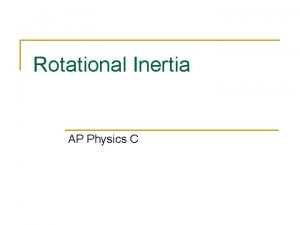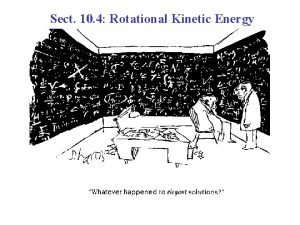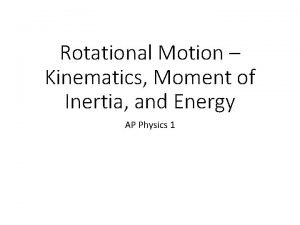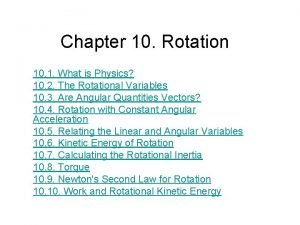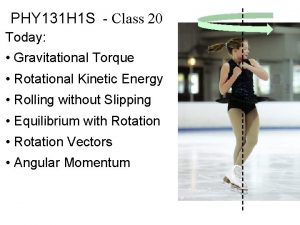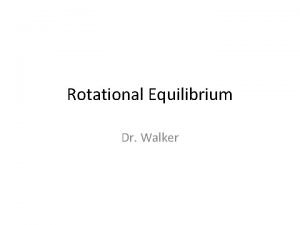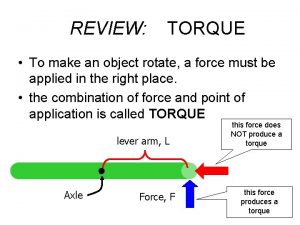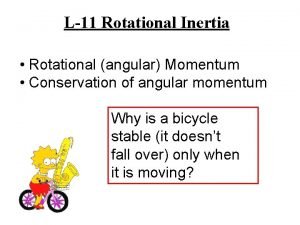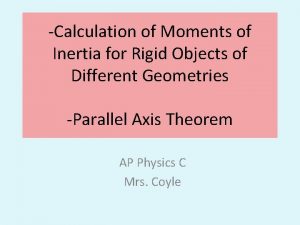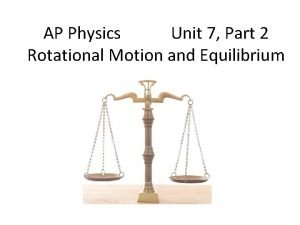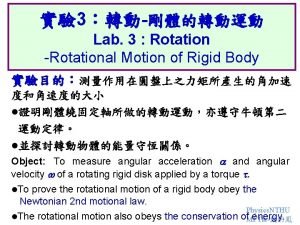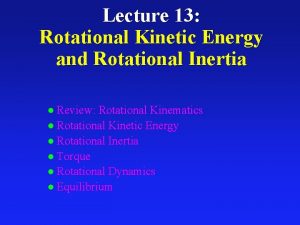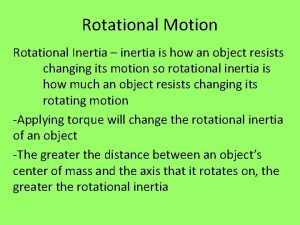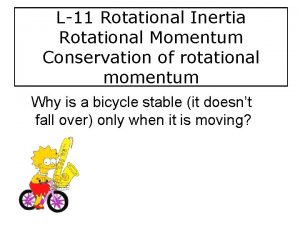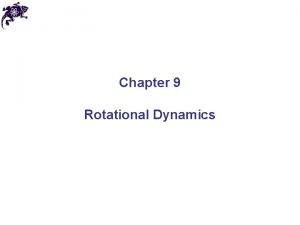Rotational Inertia AP Physics C Rotational Kinetic Energy













- Slides: 13

Rotational Inertia AP Physics C

Rotational Kinetic Energy and Just like massive bodies tend Inertia to resist changes in their motion ( AKA - "Inertia"). Rotating bodies also tend to resist changes in their motion. We call this ROTATIONAL INERTIA. We can determine its expression by looking at Kinetic Energy. We now have an expression for the rotation of a mass in terms of the radius of rotation. We call this quantity the MOMENT OF INERTIA (I) with units kgm 2

Moment of Inertia, I Since both masses are moving they have kinetic energy or rotational kinetic in this case. r 1 m 2 r 2 So this example clearly illustrates the idea behind the SUMMATION in the moment of inertia equation.

Example A very common problem is to find the velocity of a ball rolling down an inclined plane. It is important to realize that you cannot work out this problem they way you used to. In the past, everything was SLIDING. Now the object is rolling and thus has MORE energy than normal. So let’s assume the ball is like a thin spherical shell and was released from a position 5 m above the ground. Calculate the velocity at the bottom of the incline. If you HAD NOT included the rotational kinetic energy, you see the answer is very much different. 7. 67 m/s

Example: Moment of Inertia, I Let's use this equation to analyze the motion of a 4 -m long bar with negligible mass and two equal masses(3 -kg) on the end rotating around a specified axis. m 1 m 2 EXAMPLE #1 -The moment of Inertia when they are rotating around the center of their rod. 24 kgm 2 m 1 EXAMPLE #2 -The moment if Inertia rotating at one end of the rod 48 kgm 2

Example cont’ Now let’s calculate the moment of Inertia rotating at a point 2 meters from one end of the rod. m 1 m 2 2 m 120 kgm 2 As you can see, the FARTHER the axis of rotation is from the center of mass, the moment of inertia increases. We need an expression that will help us determine the moment of inertia when this situation arises.

Parallel Axis Theorem This theorem will allow us to calculate the moment of inertia of any rotating body around any axis, provided we know the moment of inertia about the center of mass. It basically states that the Moment of Inertia ( Ip) around any axis "P" is equal to the known moment of inertia (Icm) about some center of mass plus M ( the total mass of the system) times the square of "d" ( the distance between the two parallel axes) Using the prior example let’s use the parallel axis theorem to calculate the moment of inertia when it is rotating around one end and 2 m from a fixed axis.

Exam – Parallel Axis Theorem 48 kgm 2 m 1 m 2 d = 2 m m 1 m 2 4 m 120 kgm 2 (not drawn to scale)

Continuous Masses The earlier equation, I =Smr 2, worked fine for what is called POINT masses. But what about more continuous masses like disks, rods, or sphere where the mass is extended over a volume or area. In this case, calculus is needed. This suggests that we will take small discrete amounts of mass and add them up over a set of limits. Indeed, that is what we will do. Let’s look at a few example we “MIGHT” encounter. Consider a solid rotating about its CM. Will, I =Smr 2, be the equation for a rod?

The rod We begin by using the same technique used to derive the center of mass of a continuous body. dr The CM acts as the origin in the case of determining the limits.

Your turn What if the rod were rotating on one of its ENDS? dr As you can see you get a completely different expression depending on HOW the body is rotating.

The disk R r dx 2 pr dx

The bottom line. . Will you be asked to derive the moment of inertia of an object? Possibly! Fortunately, most of the time the moment of inertia is given within the free response question. Consult the file ( on the notes page) called Moments of Inertia to view common expressions for “I” for various shapes and rotational situations.
 Parallel axis theorem ap physics c
Parallel axis theorem ap physics c Moment of intertia of a disk
Moment of intertia of a disk Kinetic rotational energy formula
Kinetic rotational energy formula A rigid sculpture consists of a thin hoop
A rigid sculpture consists of a thin hoop Rotational kinetic energy
Rotational kinetic energy Definition of kinetic energy in physics
Definition of kinetic energy in physics Formula of kinetic energy
Formula of kinetic energy Physics classroom kinetic energy
Physics classroom kinetic energy Equation for torque and angular velocity
Equation for torque and angular velocity How make your small big
How make your small big Rotational inertia symbol
Rotational inertia symbol Moment of inertia of shaft formula
Moment of inertia of shaft formula Ap physics unit 7 mcq
Ap physics unit 7 mcq Rotational inertia unit
Rotational inertia unit
